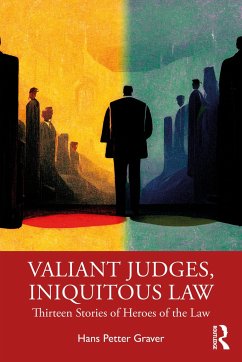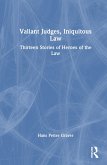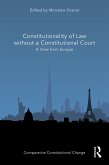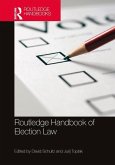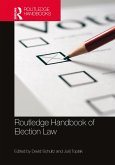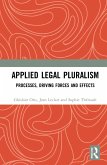This book is about heroes of law. It provides examples of when judges have exercised courage, moderation, wisdom, and justice rather than blindly following the law. It also discusses the contentious issue of whether a judge has a moral responsibility to defend the rule of law, regardless of what the law actually states. The work presents a collection of thirteen stories about judges who in different settings have stood up against the authorities and public opinion in the defence of the rule of law. An introductory chapter sets the scene with two examples of situations gone wrong when those applying the law have just followed the demands of those in power. The thirteen stories are followed by two theoretical chapters discussing the moral responsibility of the judge. Finally, the book explores the kind of ethical theory required to guide judges in the assessments they must make, and the choices they have to take in order to fulfil their moral responsibilities. It is argued that theclassic virtues of courage, moderation, wisdom, and justice are all qualities that can contribute to both sound judgment and reflection. The book thus seeks to nurture a realistic culture and a tradition of cultivating lawyers who defend the rule of law. Against a background where the history of our legal institutions when put to the test, is largely nothing to be proud of, the work seeks to change this by highlighting and reflecting on the exceptions. The book will be illuminating reading for students and academics working in the areas of Jurisprudence, Legal Ethics, and Legal History.
`In times of authoritarian resurgence, Graver's inspiring profiles of judicial courage could not be more timely and consequential. An eminent scholar on judiciaries, Graver elevates the ideal of legal heroism in times of terror, war and repression. Gracefully and persuasively written, this superb volume should not only be mandatory reading for every course anywhere in legal ethics but also for thoughtful citizens who seek gripping prose that enlivens and uplifts.'
Terence Halliday, American Bar Foundation and Australian National University
'When should a judge defend law against attacks by those in power? And when should a judge stand up against evil or oppressive laws? Valiant Judges, Iniquitous Law: Thirteen Stories of Heroes of the Law illuminates these profound challenges with historical examples ranging across centuries and continents. As authoritarian regimes currently threaten judicial independence in fragile democracies, this vital work unleashes critical awareness, conscience, and courage.'
Martha Minow, 300th Anniversary University Professor, Harvard Law School
'This book by a famous Norwegian researcher and jurist, former dean of the University of Oslo Law School is worth special attention. Telling the life stories of his heroes, the author, among other things, analyses issues such as the right against the law and in the struggle for the law, natural law and legal positivism, minimum moral requirements for the law, the difference between the rule of law and the legal order, whether the ethics of the judge's virtues is conservative, etc.. The author notes that 'Authoritarian rulers learn from each other, cynically exploiting the gaps in the rule of law that democratic and liberal countries sometimes leave in an attempt to serve a good cause. That is why attacks on the rule of law must not go unanswered, particularly when they occur on our territory'.'
Hanna Vronska, Justice of the Supreme Court of Ukraine; Endorsement of Ukrainian translation
'The author's considerations about the virtues that should be inherent in judges, as well as about who should be responsible for the morality of laws, deserve special attention... In my opinion, every judge when putting on the robe should understand that from time to time he may be faced with a difficult choice between justice, the rule of law and the expectations of, say, the authorities or even society, which are not based on these principles.'
Valentyna Danishevska, Chief Justice of the Supreme Court of Ukraine 2017-2021; Endorsement of Ukrainian translation
Terence Halliday, American Bar Foundation and Australian National University
'When should a judge defend law against attacks by those in power? And when should a judge stand up against evil or oppressive laws? Valiant Judges, Iniquitous Law: Thirteen Stories of Heroes of the Law illuminates these profound challenges with historical examples ranging across centuries and continents. As authoritarian regimes currently threaten judicial independence in fragile democracies, this vital work unleashes critical awareness, conscience, and courage.'
Martha Minow, 300th Anniversary University Professor, Harvard Law School
'This book by a famous Norwegian researcher and jurist, former dean of the University of Oslo Law School is worth special attention. Telling the life stories of his heroes, the author, among other things, analyses issues such as the right against the law and in the struggle for the law, natural law and legal positivism, minimum moral requirements for the law, the difference between the rule of law and the legal order, whether the ethics of the judge's virtues is conservative, etc.. The author notes that 'Authoritarian rulers learn from each other, cynically exploiting the gaps in the rule of law that democratic and liberal countries sometimes leave in an attempt to serve a good cause. That is why attacks on the rule of law must not go unanswered, particularly when they occur on our territory'.'
Hanna Vronska, Justice of the Supreme Court of Ukraine; Endorsement of Ukrainian translation
'The author's considerations about the virtues that should be inherent in judges, as well as about who should be responsible for the morality of laws, deserve special attention... In my opinion, every judge when putting on the robe should understand that from time to time he may be faced with a difficult choice between justice, the rule of law and the expectations of, say, the authorities or even society, which are not based on these principles.'
Valentyna Danishevska, Chief Justice of the Supreme Court of Ukraine 2017-2021; Endorsement of Ukrainian translation

